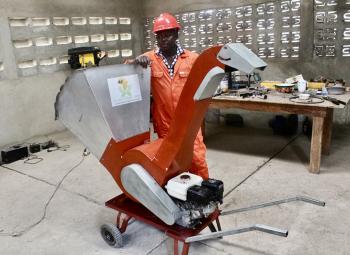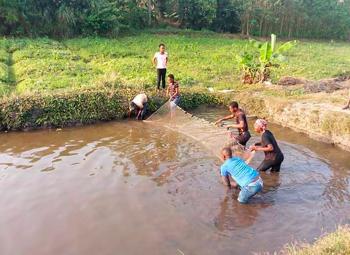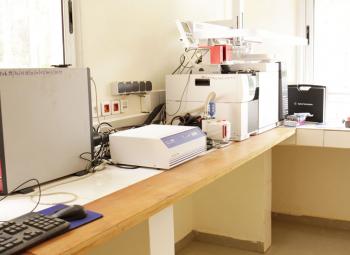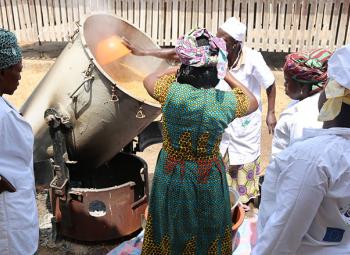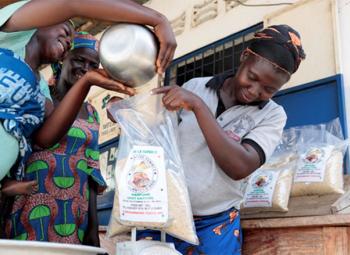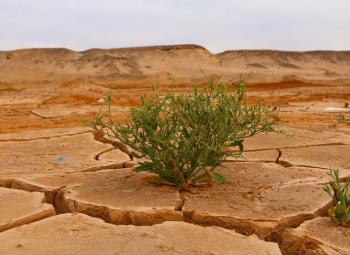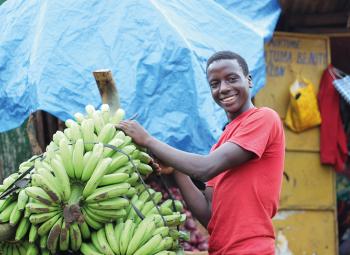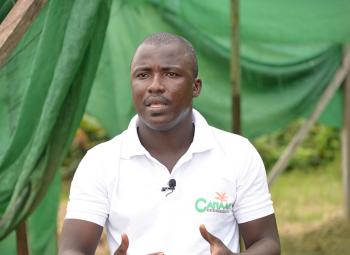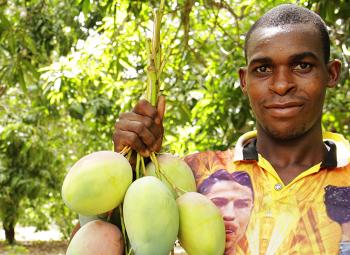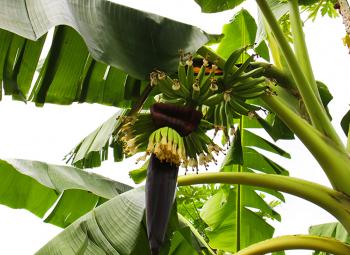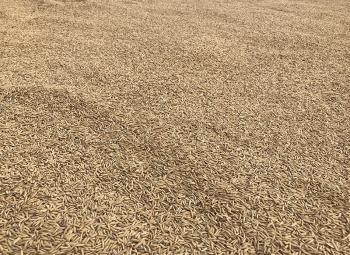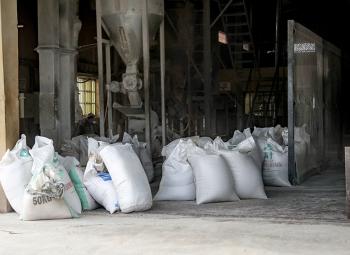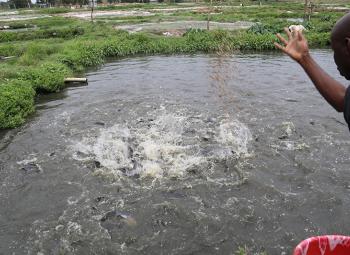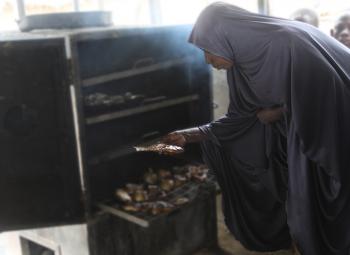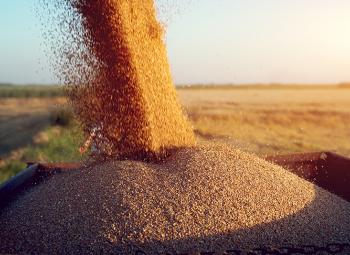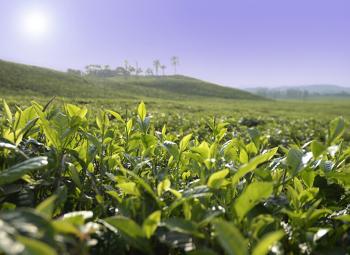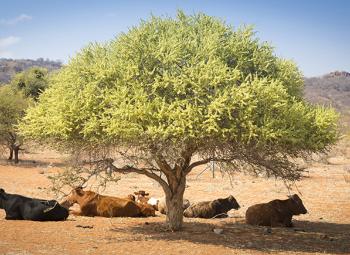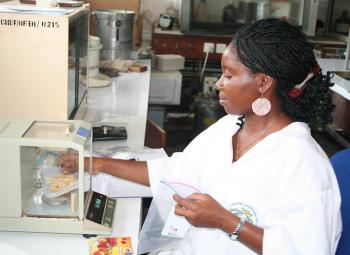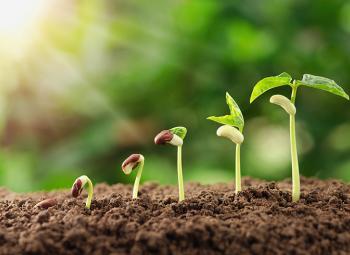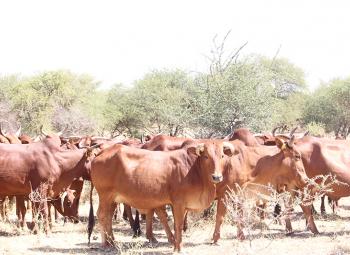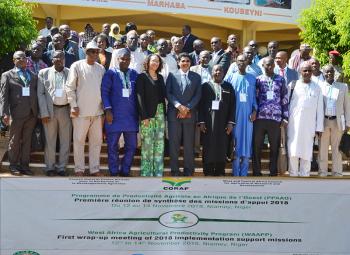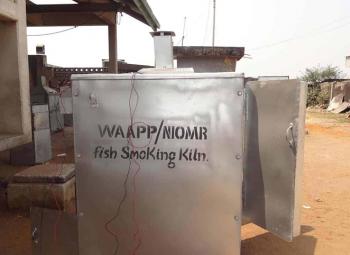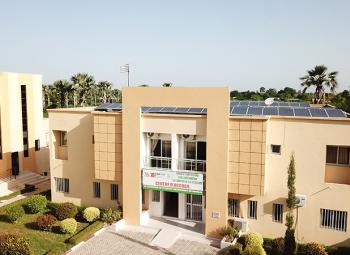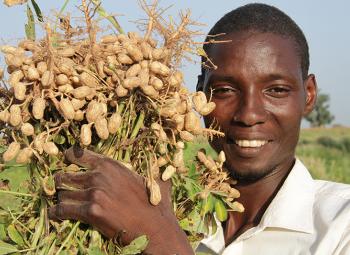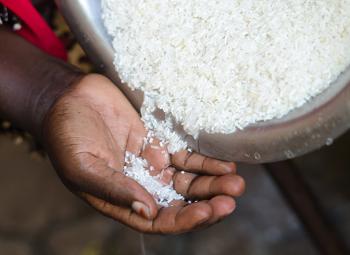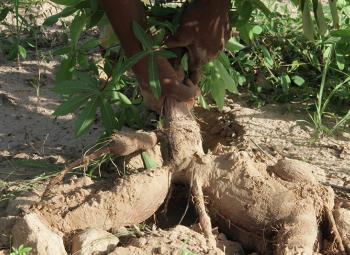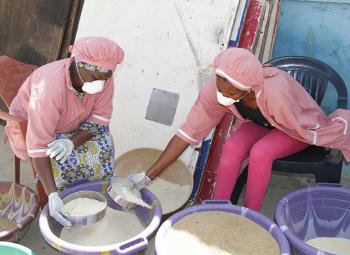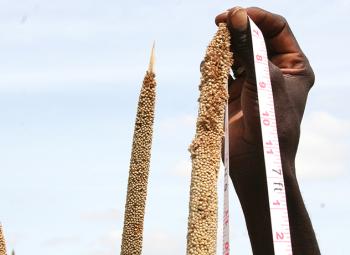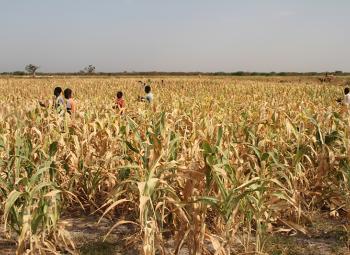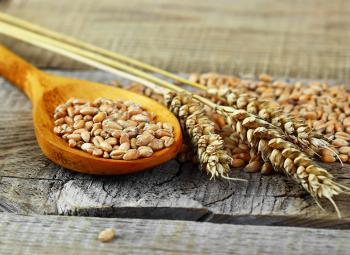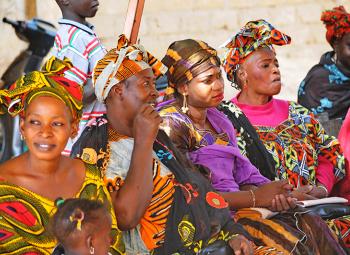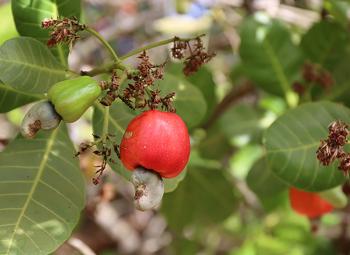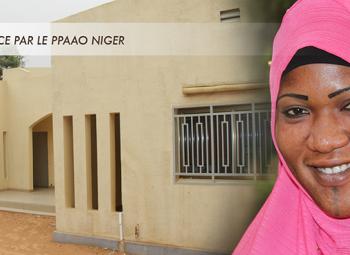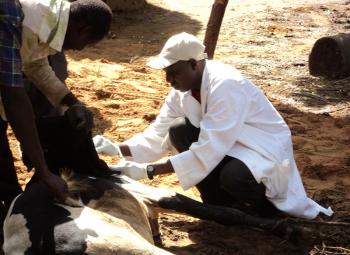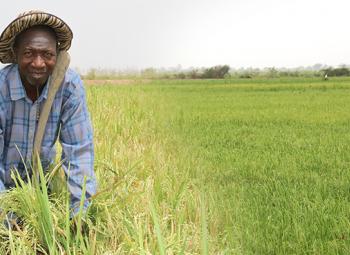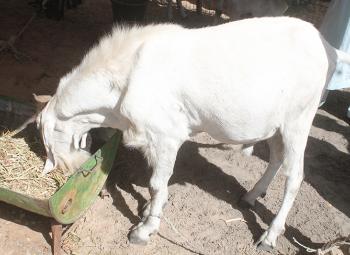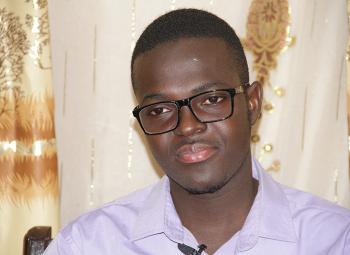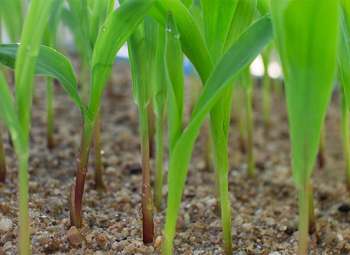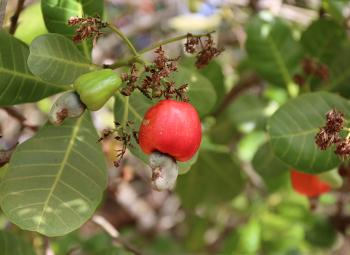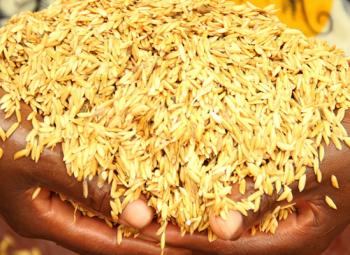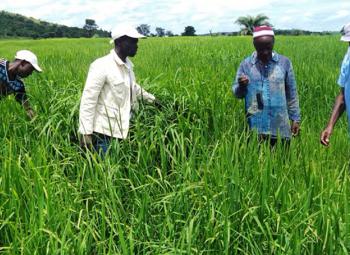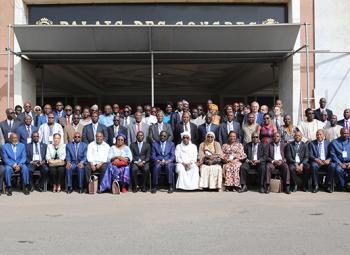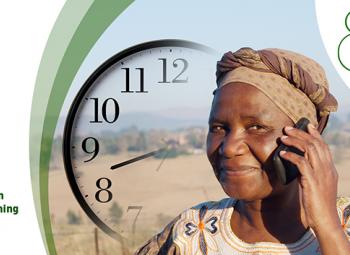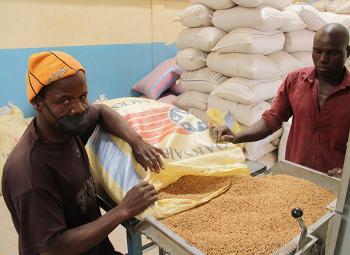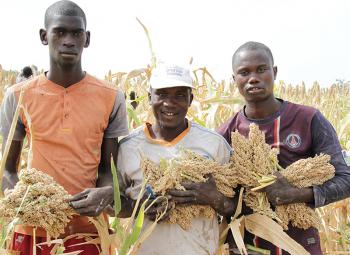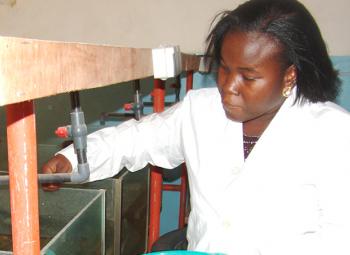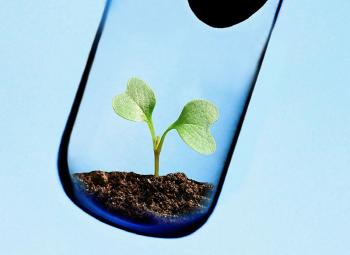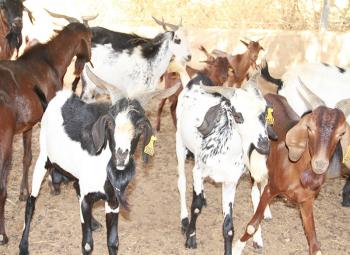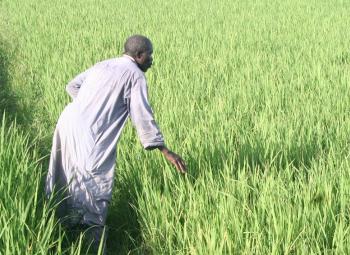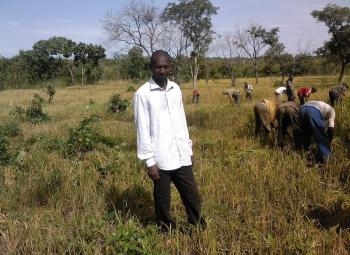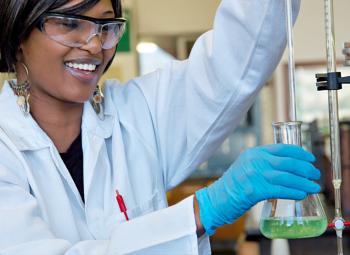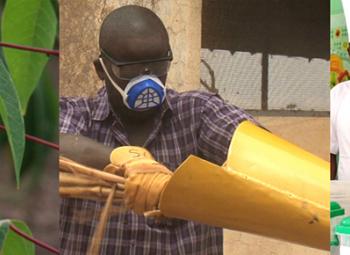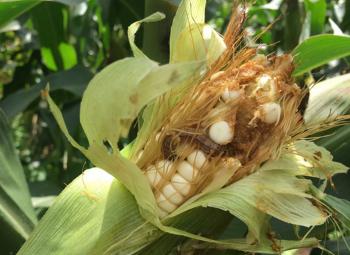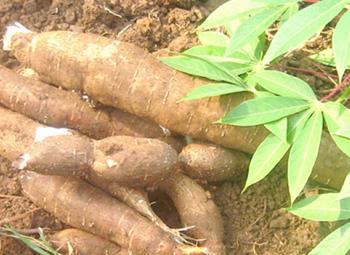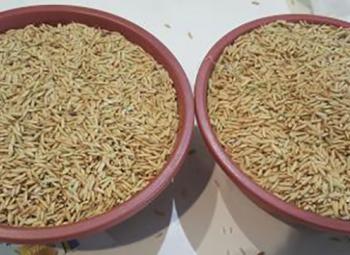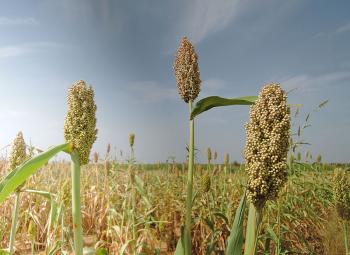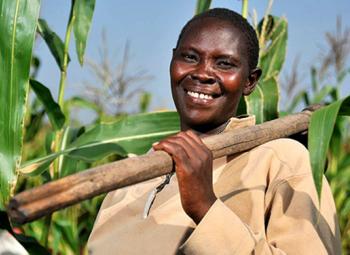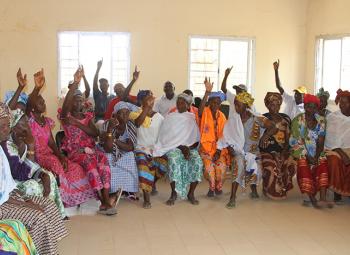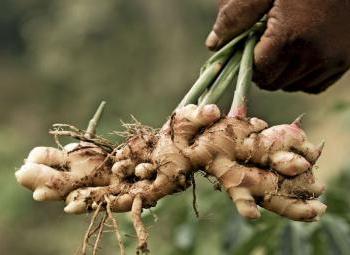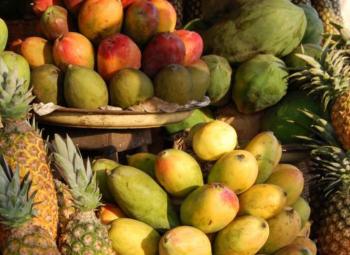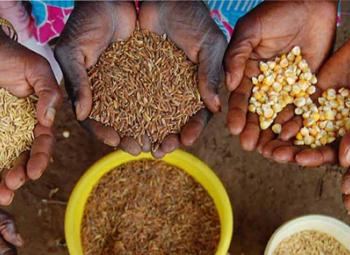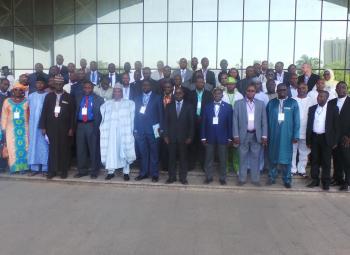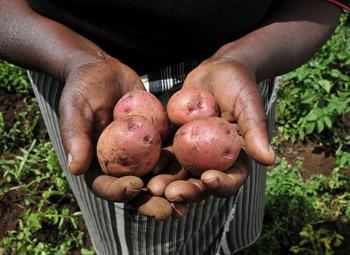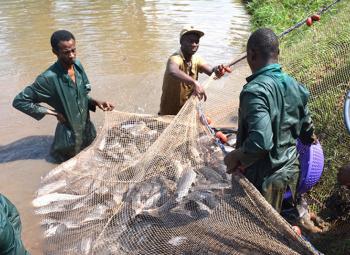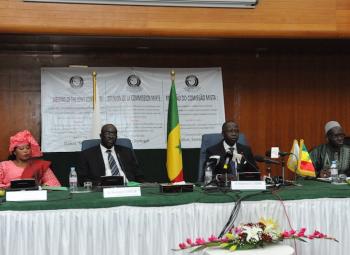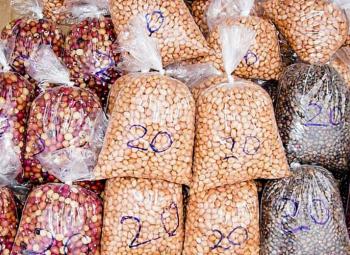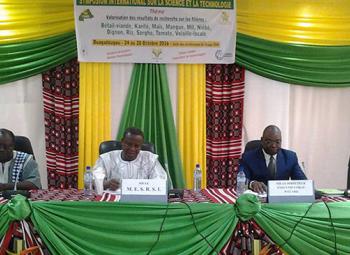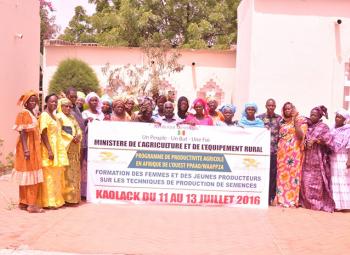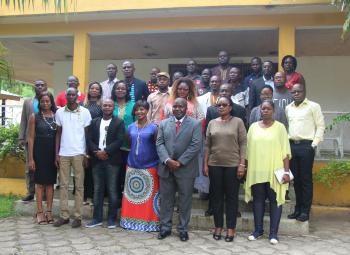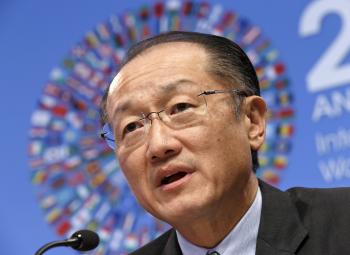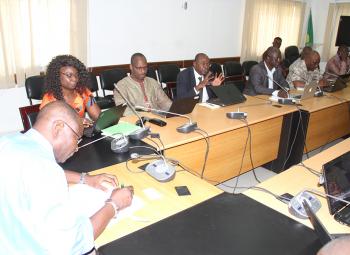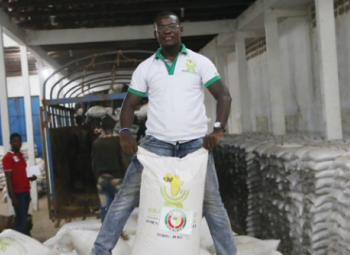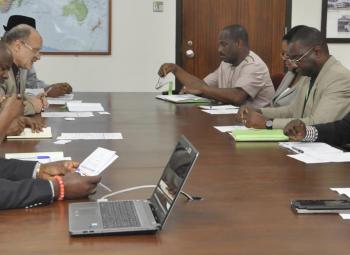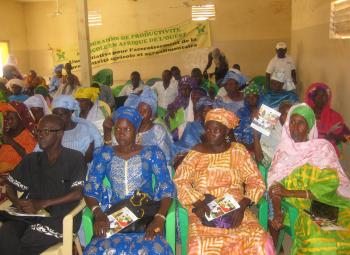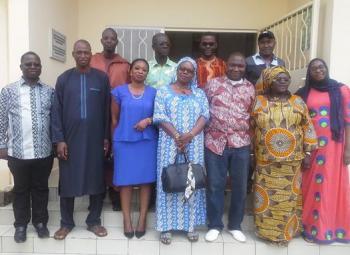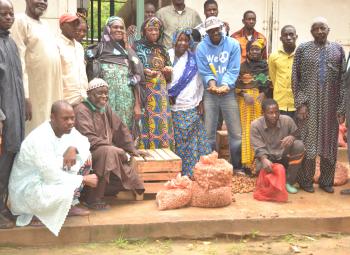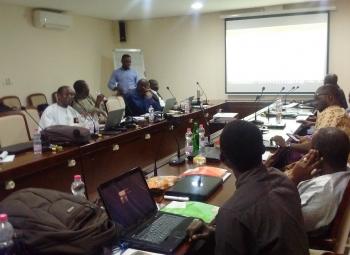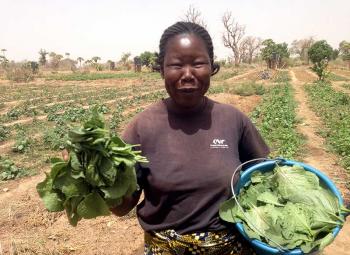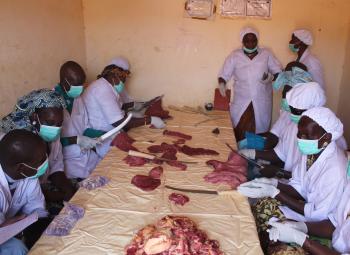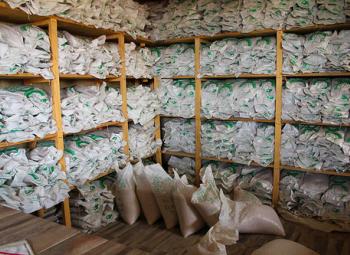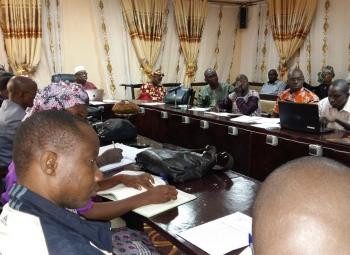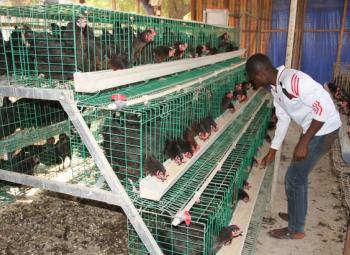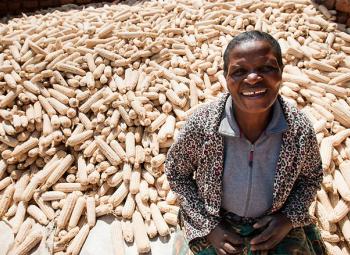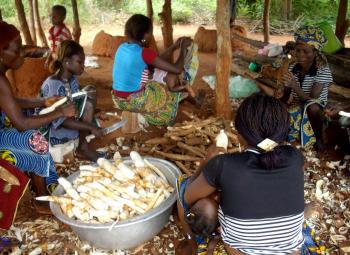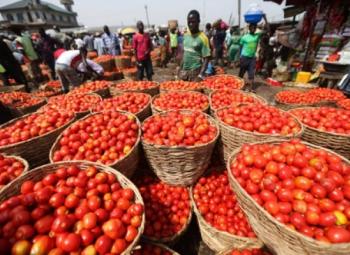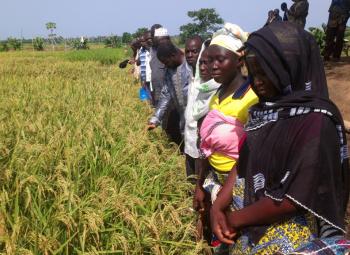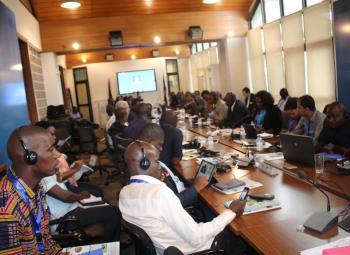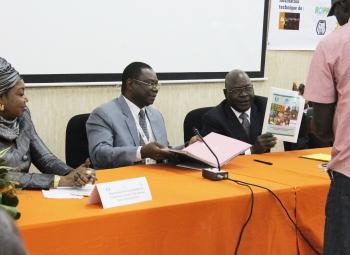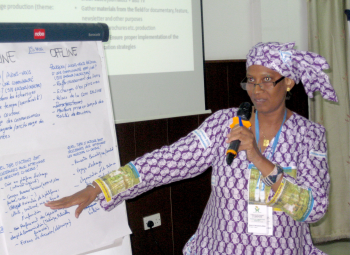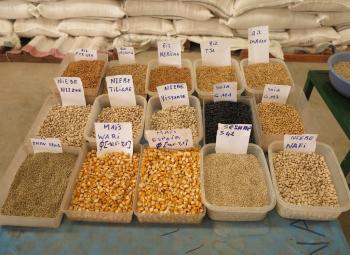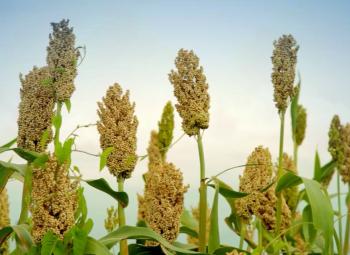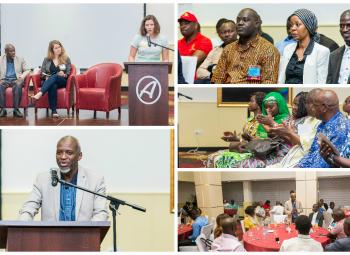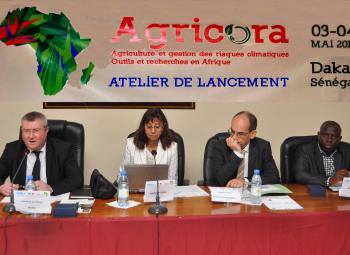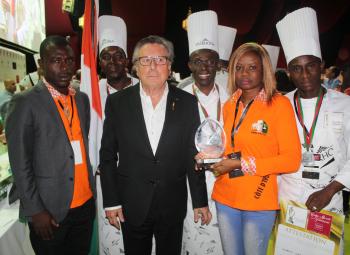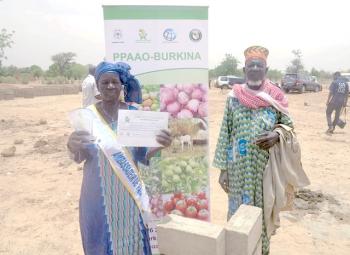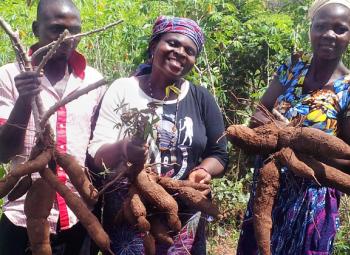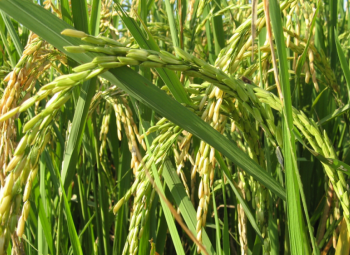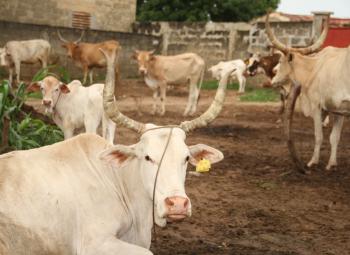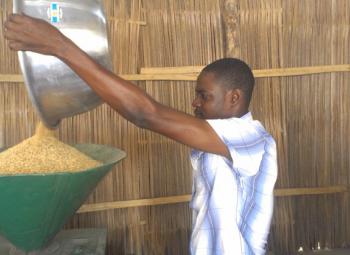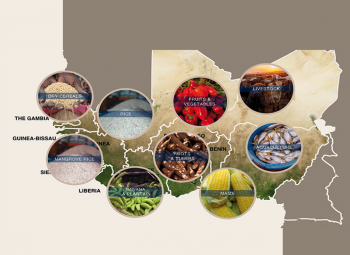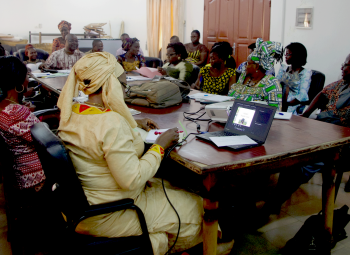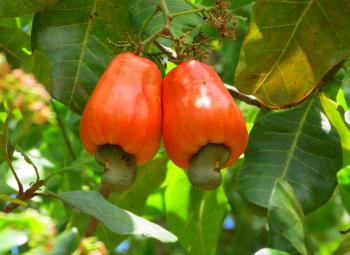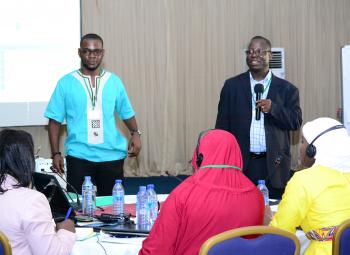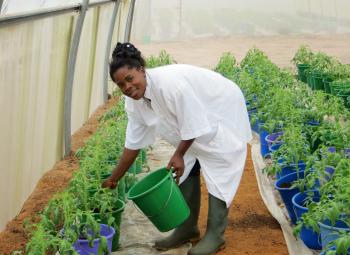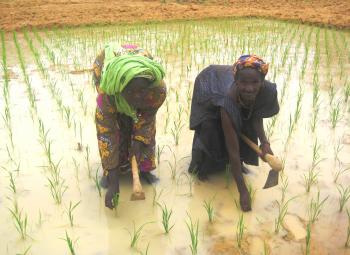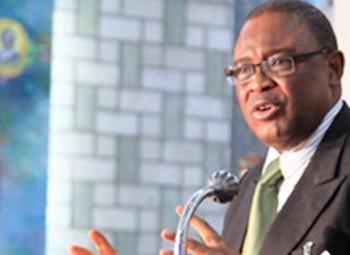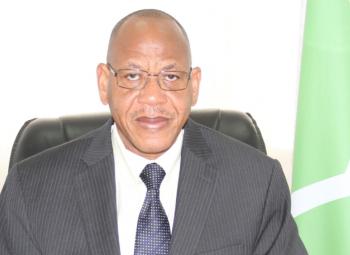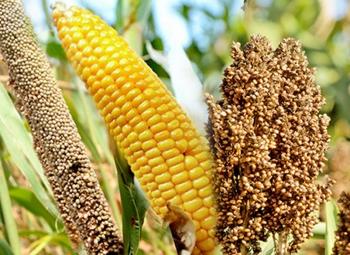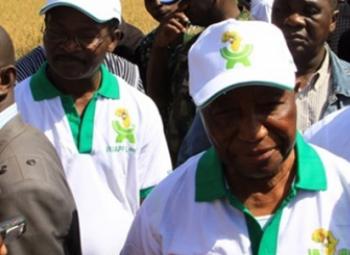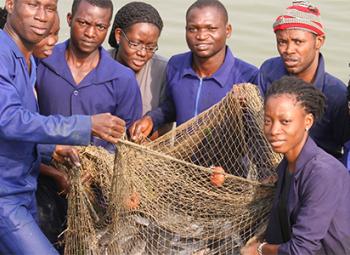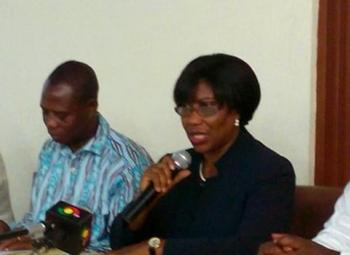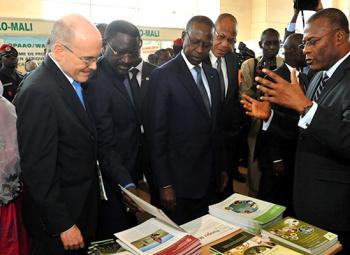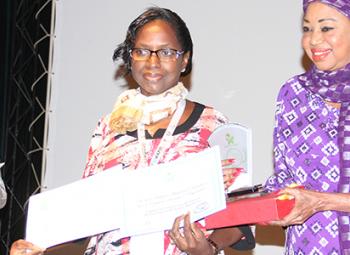Togo08 July 2020 /
His Dream Becomes Real Thanks to WAAPP
Thanks to the West Africa Agriculture Productivity Program (WAAPP), a young Togolese has considerably transformed his personal and business fortunes. From an annual turnover of 4 million FCFA (USD 6,890) before the WAAPP, Guema Concept, a company put in place by Guema M’Bantana, now has a yearly turnover of 120 million CFA francs (USD 206,710). The story of Guema M’Bantana is similar to that of millions of young Africans who dream of changing agriculture and easing producers’ burdens. Thanks to WAAPP Togo, Guema’s dream has come true. After his university training in physical science, Guema, very early on, nurtured the ambition to develop agricultural technologies that meet the producers’ needs. However, due to a lack of resources, he turned to teach physical science in colleges and occasionally worked on egg incubators production.
Guinea08 July 2020 /
More Agribusiness Millionaires Emerge In West Africa
The last three years have seen two Guinean brothers’ fortunes change in substantial ways thanks in part to innovations from the West Africa Agriculture Productivity Program (WAAPP-Guinea). Using innovative technologies such as the Red Goat of Maradi and an integrated fish farming technique, Ismael Fataye Yannick and Yacouba Fataye are now recording an annual turnover of close to 75 million Guinean francs (USD 7,800) per year. Put in the Guinean context where the majority of the population survives on less than USD 2 per day, this becomes a considerable revenue.
Burkina faso18 February 2020 /
Fruits and Legume Hub Gets New Lab Paving Way for Quality Research
The new laboratory of the Fruits and Legume Regional Center of Specialization has been inaugurated by Burkina Faso Minister of Higher Education, Scientific Research, and Innovation. The ceremony took place on Thursday, February 7, 2020, in Bobo Dioulaso, located about 270 kilometers south of the capital, Ouagadougou. The Fruits and Legumes center of specialization is an offshoot of a new research arrangement in West Africa that allows the pooling of resources (human and financial) to one center with a focus on a specific commodity.
Benin29 January 2020 /
In Central Benin, Parboiled Rice Production is Breathing New Life into Rural Communes
Glazoué, Benin, January 28, 2020―The bustling activity in the beautiful building facing the Agouagon train station serves as a counterpoint to the deadly silence in the totally deserted railway building. About ten women are busy at work around a traditional oven, pouring unhusked parboiled rice into large bowls before letting it dry for several days and taking it to downtown Glazoué for husking and cleaning. Welcome to the Agouagon Cooperative of Women Rice Parboilers, which is trying to breathe new life into a small town some four hours away from Cotonou seeking to become a dynamic hub.
Togo29 January 2020 /
In Togo, a Women Farmers’ Cooperative Successfully Produces Premium Quality Rice
Anié, January 28, 2020-It is market day in Anié, a commercial city 200 kilometers north of Lomé. The breakfast crowd is even bigger in front of Anifa Aboubacar’s stall. Customers of all ages are lining up for her “watché.” For more than 20 years, she has prepared this African fried rice garnished with fried white beans and peppers every day. This dish is very popular in several West African countries. And she does not alter the recipe, stating that “true watché is made with parboiled rice. Here in Anié, we have always remained faithful to this tradition.”
CORAF27 January 2020 /
To What Extent was WAAPP Climate-Smart?
Projects implemented under the West Africa Agriculture Productivity Program (WAAPP) in Benin, Guinea, Niger, Togo, and Chad mainstreamed climate-smart agriculture dimensions at differentiated levels, an assessment has concluded. The participatory assessment was conducted by the CGIAR Research Program on Climate Change, Agriculture and Food Security (CCAFS).
CORAF15 November 2019 /
One of West Africa’s largest agricultural projects in modern history is about to enter the final lap. Touted by initiators as a novelty and the first-of-its-kind in the history of the region, the West Africa Agriculture Productivity Program (WAAPP) officially ends on December 31, 2019. But before that, countries will meet one more time to assess the progress made in the implementation of the ongoing phase, pay tribute to one of the program’s architects and determine how best to build on the infrastructure put in place by the WAAPP.
Cote d’Ivoire13 September 2019 /
Making FCFA 85 Million ($180,000) a Year Using WAAPP Technology
An innovative agribusiness enterprise, Canaan Agriculture Sarl, registered in Abidjan, Cote d’Ivoire’s economic capital, had an annual turnover, of close to 85 million FCFA (USD$180.000) in 2018. Canaan Agriculture Sarl belongs to a 32-year-old Ivorian, Narcisse Aman, one of the nurserymen trained under the West Africa Agriculture Productivity Program (WAAPP) in Cote d’Ivoire. Canaan Agriculture Sarl belongs to a 32-year-old Ivorian, Narcisse Aman, one of the nurserymen trained under the West Africa Agriculture Productivity Program (WAAPP) in Cote d’Ivoire.
Burkina faso13 June 2019 /
Mango Exports on the Rise Again in Burkina Faso as a Result of Research
Les producteurs de mangues du Burkina Faso ont repris le contrôle des attaques des mouches des fruits, ces petits insectes nuisibles qui ont déjà dévasté des vergers entiers de mangues dans la sous-région. Avec une surveillance et un contrôle amélioré des mouches des fruits, ce pays d’Afrique de l’Ouest a vu sa production de mangues passer de 90.000 tonnes en 2017, à 200.000 tonnes en 2018, selon l’interprofession de la filière mangue du Burkina Faso (APROMAB). En termes de progression, cela représente une augmentation de 115 %.
Burkina faso12 June 2019 /
Research Collaboration Stimulates Plantain Cultivation in Burkina Faso
By 2014, farmers in Burkina Faso had little experience cultivating plantain. “Plantain cultivation in Burkina Faso was rare at the time,” says Paul Iboudou, a veteran research technician with the Western region of the Agricultural and Environmental Research Institute of Burkina Faso (INERA). Fueled by a new form of regional research collaboration facilitated by the West Africa Agricultural Productivity Program (WAAAP), INERA imported three improved cultivars (PITA, FHIA, and Big Ebanga) from neighboring Cote d’Ivoire.
Nigeria23 May 2019 /
Early Signs of Boon for Businesses as Seed Laws are Harmonized
Enterprises in West Africa are now delivering seeds across borders quicker and in larger quantities as a regional rule allowing the free movement of people and vital goods sets in. Not only are businesses seeing an increase in profits as a result of expanding market opportunities, but the poor smallholder farmers are also able to access quality and certified seeds at the start of the planting season.
Nigeria23 May 2019 /
Private Investments Jolt Fish Feed Production in Nigeria
Fish feed production has seen a remarkable increase in Nigeria recently as a result of private investments. The renewed willingness of public research institutions to work in collaboration and partnership with established private businesses is proving vital in the production and distribution of critical aquaculture technologies and inputs across Nigeria. Triton, one of Nigeria’s largest fish producers is partnering with Nigerian Institute for Oceanography(NIOMR ) to produce fish feed at its Badore Fish Farm, on the outskirts of the economic capital, Lagos. About 180 metric tons of extruded floating fish feed is produced monthly representing about 2200 metric tons per year. For a country experiencing both growths in the aquaculture value chain and the demand for fish feed, this is a substantial relief.
Nigeria23 May 2019 /
The Trending Nigerian Blue Collar Jobs in Aquaculture
Innovative aquaculture practices brought about the West Africa Agriculture Productivity Program are opening new employment opportunities for young Nigerians. Several years after communities were trained in fish farming, integrated aquaculture, and new ways of producing quality fingerlings, thousands of youths and families have either joined fish farming or expanded their farms and as a result, increasing their incomes and livelihoods.
Nigeria23 May 2019 /
WAAPP Gender-Sensitive Technology Uplifts Women’s Dignity
Incomes of women in rural Africa could sometimes be laughable as they tend to be considerably low for survival. For all their contributions to the upkeep of the household, they often have restrained rights and little or no voice in decision making. Combined with cultural restrictions, they become more vulnerable. In Muslim-dominated communities such as northern Nigeria, some of the ‘cultural norms’ mean they cannot fully participate in income-generating activities despite their willingness to do so.
Nigeria20 May 2019 /
An Aquaculture Millionaire at 25
When 25-year old Olubunmi Aderinsola Yahya arrived to do her bachelor’s degree in the Department of Aquaculture and Fisheries Management (DAFM) in the University of Ibadan in Nigeria, she had no idea; it might one day propel her to a millionaire. After all, for a long time, many university aspirants were shunning the department in part because of the disregard of the potential of aquaculture and fisheries management or because it was not one of the trending courses on campus.
Chad28 March 2019 /
Climate Relief Soon for Chadian Farmers?
With the agreements finalized and the project launched, Chad, with the support from development partners, has embarked on a long and exciting journey to bring climate-smart innovations to farmers facing the consequences of climate change. The Climate Resilience Agriculture and Productivity Enhancement Project (ProPAD) is an initiative of the Chadian government. It is primarily aimed at facilitating the deployment of climate-sensitive technologies in priority commodities in targeted communities in Chad.
CORAF28 March 2019 /
How to Produce More While Safeguarding Ecosystems?
West and Central African governments face sizable challenges to not only grow enough food to feed its swelling population but to also do so in a way that prevents harm to the environment. With other regions of the world experiencing increase food production while conserving the ecosystem, experts in West Africa are starting to mull over trying farming models that tackle the adverse effects of climate change to smallholder farmers and natural resource degradation. This model of farming is called conservation agriculture. Not only does it maintain permanent soil cover it also ensures minimum soil disturbance.
CORAF28 March 2019 /
CORAF and FAO Team up to Tackle the Challenges of the Sahel
Two of West Africa’s agriculture research and development partners are examining the possibilities of strengthening their collaboration to tackle some of the Sahel’s most intractable challenges. Meeting in Dakar, Senegal, on Friday, March 8, 2019, senior officials of Sub-Regional Office for West Africa of the Food and Agriculture Organization of the United Nations (FAO) and those of the West and Central Africa Council for Agricultural Research and Development, concluded that the challenges of land degradation, droughts, and migration are solvable from a research and innovation perspective.
CORAF28 March 2019 /
Women Lead the Way in Technology Adoption
As the international community celebrates women, data from Africa’s largest sub-regional research organization shows an impressive adoption rate of technologies by women. Out of about nine million direct beneficiaries of the Agricultural Productivity Program in West Africa (WAAPP), close to 4.5 million were women, representing about 49 percent. Overall, the WAAPP benefitted about 56 million people indirectly and trained a new generation of agricultural scientists. Three of every ten researchers trained by thirteen West African countries involved in the WAAPP in the past ten years were women.
Cote d’Ivoire28 March 2019 / theme1
Brighter Days Ahead for Plant Nutrition Research in West Africa
A ceremony to launch the West African regional program office of the International Plant Nutrition Institute (IPNI) held in Cote d’Ivoire’s economic capital, Abidjan, recently in the presence of several government actors and scientific partners including CORAF.
Niger16 November 2018 /
Niger : Innovations double milk production in Toukounous
Milk production in the Toukounous dairy farm in Niger has more than doubled as a result of innovations provided by the West Africa Agriculture Productivity Program (WAAPP). “Milk yield per cow has doubled since the start of the WAAPP project,” Prof. Moumouni Issa of both the Faculties of Science and Agronomy of the Abdou Moumouni University located in Niger’s capital, Niamey said.
Niger13 November 2018 /
8 Nigerien Ministers Show up To Support WAAPP
In an extraordinary show of endorsement of agricultural research and the West Africa Agriculture Productivity Program (WAAPP), eight government ministers showed up Monday, November 12, 2018, for the opening ceremony of the annual gathering of WAAPP actors.
Nigeria05 November 2018 /
Smoking Fish Reduces Waste—and Improves Incomes
A fish smoking kiln from the Nigerian Institute for Oceanography and Marine Research (NIOMR) is helping transform the lives of West Africans who depend on fishing for their livelihoods. Comprised of a smoking chamber, a fan to distribute heat, a thermometer to control temperature, and a chimney to filter air, NIOMR’s fish smoking kiln reduces cooking and smoking time from four days to just four hours. The fish smoking kiln eliminates many challenges West African fisheries typically encounter with traditional smoking methods—including lack of control over the drying process, exposure to dirt and dust, insect infestation, exposure to contaminants, and low capacity.
Senegal02 November 2018 /
Fully equipped, the Regional Center on Dry Cereals Assumes ItS Catalytic Role
If there was one wish by actors of the West Africa Agriculture Productivity Program (WAAPP) at the inception of the centers of excellence, it was to see them begin the process of creating the required collaboration and partnerships to catalyze the critical innovations and technologies to address the region’s priority crops. After many years of substantial investments in both operations and infrastructure, the Dry Cereal Center of Excellence based in Senegal is now fully equipped thanks to WAAPP Senegal and driving the vital research work on millet, maize, sorghum and other cereals.
Senegal02 November 2018 /
WAAPP Sows Seeds of Resilience in Senegal
The geographical location of Senegal along the Sahelian belt of Africa means its agriculture is already facing the brunt of climate change. Experts argue that if urgent measures are not taken, small-scale farmers are likely to suffer the most. Peanut ranks among Senegal’s top five largest export commodities with millions of small-scale farmers involved.
Senegal02 November 2018 /
“Senegalese Farmers Now Buying Less Rice”
Yields barely lasted three months for rice-producing households of Ngoungoul, a village located about 250 Kilometers to the South of the capital, Dakar. The conventional rice cultivation methods did not only require more water, seeds, and fertilizers, the harvest often fell short of expectation. In Senegal as in most part of West Africa, rice is a major staple. Meaning, when yields are low, households have to resort mostly to imported rice to make up for the deficit.
Senegal22 October 2018 /
Regional Cooperation Strengthens Senegal Cassava Sector
Cassava may not be the number one crop in Senegal. Compared to maize, millet, sorghum, peanut, or mangoes, it is right down the pecking order. The country’s annual cassava production has tended to fluctuate between 600.000-650.000 thousand metric tons in recent years.
Senegal22 October 2018 /
The Paradox of Senegalese Women Agro-Processors
The uplifting stories of brave women agro-processors of Senegal. Undaunted by the challenges, they have taken their destinies in their own hands and now contribute a modest monthly sum to purchase raw materials to keep pace with growing demand. In Pout, about 50 kilometers East from the Senegalese capital, about 2400 women have come together to seize the fresh business opportunities in the dry cereals and fruits and vegetable value chains.
Senegal17 September 2018 /
Slow Millet Productivity Pose Fresh Challenges to Researchers
Despite recent breakthroughs in research, insufficient production and climate change are challenging millet researchers anew, an international conference has heard. Communities are looking up to scientists to design new varieties that can boost productivity, feed the people of West Africa, reduce hunger and poverty.
Senegal23 July 2018 /
'Private Sector Growth Real Measure of Seed Regulation Success'
About seventeen West African countries are today credited for adopting a common seed regulation. These laws are designed to facilitate the free flow of critical seeds from one country to another. Effectively implemented, they can facilitate the access to high-quality certified seeds to farmers and producers and sustainably transform the agriculture industry in West Africa.
Senegal05 July 2018 /
West Africa Assesses Progress in Implementation of Seed Regulation
Seed actors from seventeen West African countries meet in the Senegalese capital, Dakar from Monday, July 9 to 11, 2918 to evaluate progress in the implementation of the harmonized seed regulation.
Niger05 July 2018 /
As Niger Scales up E-vouchers, More Farmers have Access to Agri-inputs
Niger has scaled up the electronic vouchers to deliver critical agri-inputs to farmers in remote corners of the country. Between May 29 to June 19, 2018, about 10000 people from the ten communes received certified millet and cowpea seeds thanks to the electronic system put in place by the West Africa Agriculture Productivity Program (WAAPP), Niger.
Senegal02 July 2018 /
Cashew Creations for Women’s Employment in Senegal
The West African Women’s Association (AFAO/WAWA) started an initiative to boost cashew processing in Senegal. Rather than selling raw cashews to traders, they decided to expand post-harvest opportunities close to home by training and equipping hundreds of women to process and market cashew apples and nuts.
Niger17 May 2018 /
Budding Scientist Whose Main Ambition is to increase Milk Production in Niger
For a society where the majority of girls and women are confined to household chores or mostly laborers in fields, breaking through the gender and societal stereotypes can be extremely challenging. But not for this 30-year-old Nigerien student taking a Ph.D. in Animal Production in the University of Abdou Moumouni in the capital, Niamey.
Niger16 May 2018 /
The "New Scientists" Re-energizing Livestock Research in Niger
About a decade ago, the department of animal production of Niger’s National Institute of Agricultural Research (INRAN) had just one PhD-qualified agricultural researcher. INRAN is Niger’s principal agricultural research agency
Mali10 May 2018 /
Off-Season Rice Fends off Malian Farmers from Climate Stress
Fifty-five-years old Boureima Sanogo has been cultivating rice since he was 15. With traditional cultivation methods on a hectare of land in the rainy season, the most yield he could get was four tons. But since the introduction of a new cultivation method known as the System of Rice Intensification(SRI) ...
Mali09 May 2018 /
How’s Niger’s Livestock Faring in Mali
Livestock farmers in West Africa are increasingly turning to the red goat of ‘Maradi‘ and the ‘Balami,’ two of Niger’s revered sheep breed, scientifically proven to adapt better to the changing climate and genetically wealthier.
Nigeria09 May 2018 /
Meet the ‘Next Generation’ of West African Agric Scientists
Agriculture research and development (R&D) in West Africa was in a bleak state in 2008. Several analyses at the time concluded that majority of PhD-qualified researchers were due to retire by 2025 creating a void in the quest for innovative solutions to tackle pressing and emerging challenges facing agricultural development.
Guinea04 May 2018 /
E-vouchers to facilitate Agri-inputs Access in Guinea
The government of Guinea has announced that it will begin piloting the use of electronic vouchers to deliver critical agri-inputs to farmers in remote corners of the country. This is thanks in part to the West Africa Agriculture Productivity Program (WAAPP).
Benin03 May 2018 /
Progress Made on Cashew Yields in Benin
Trails on plantations of cashew growers in Savè, Benin show an increase in yields and incomes when producers take suggestions on best agriculture practices from scientists. Yields in cashew nuts are generally low in Benin. They vary between 300 to 600 kilograms (kg) per hectare. Experts blame this on the poor agricultural practices. Adopting new fertilization methods can improve productivity.
Mali03 May 2018 /
Blog: Climate-smart production boosts West African rice self-sufficiency
The System for Rice Intensification (SRI) has significant potential to close the rice production gap in West Africa and put the region on the path to rice self-sufficiency, according to a new book published by researchers from Cornell University and the National Center of Specialization on Rice (NCoS-Rice), based in Mali, for the West and Central African Council for Agricultural Research and Development (CORAF).
Senegal18 April 2018 /
How Can West Africa Achieve Rice Self-Sufficiency? New Publication Offers Insights
The System for Rice Intensification (SRI) has tremendous potential to close the rice production gap in West Africa and to place the region on the desired trajectory of rice self-sufficiency, according to a new book published on Wednesday, April 18, 2018 in Dakar, Senegal.
Senegal10 April 2018 /
Invest in Research, Anticipate Challenges, Generate Useful Solutions, Senegalese Minister
The Senegalese Minister of Agriculture and Rural Infrastructure, Dr. Papa Abdoulaye Seck has challenged agricultural researchers of West and Central Africa to step up their game to anticipate challenges facing their communities and to generate relevant innovations that meet the needs of users.
Senegal04 April 2018 /
Research Hubs to Assess Progress Towards Excellence
Actors of nine West Africa agriculture research hubs are meeting in Saly, Senegal to assess progress towards the coveted status of Regional Centers of Excellence (RCoE). The nine National Centers of Specialization were established with an understanding that they will progressively graduate to RCoE based on a set of pre-defined criteria.
Senegal08 March 2018 /
Women as End-users & Catalyst of Technologies and Innovations
As the international community celebrates women, another window opens to reflect not only the many gender disparities existing in our communities today but to also reflect on how women can drive technology innovation and science.
Sierra Leone01 March 2018 /
“West Africa Rice Must be Able to Compete with Imported Rice,” Dr. Abdoulaye Touré
Increasing production may be one of the solutions to achieving rice self-sufficiency as desired by most African countries. But quality rice capable of competing favorably with the imported variety seems to be the sustainable solution.
Senegal01 March 2018 /
CORAF Joins New Global Research Program on Grain Legumes and Dryland Cereals
A new global research program on grain legumes and dryland cereals (GLDC) has been launched in Addis Ababa, Ethiopia. Results of the program are expected to improve the nutrition security of people living in West and Central Africa.
Guinea23 February 2018 /
WAAPP Offers 25 New Scholarships to Young Guineans
Twenty-five young Guineans have been awarded two-years Master degree scholarships to improve their knowledge and skill in the field of agriculture. The students shall study in one of West Africa’s oldest colleges, the University of Ibadan in Nigeria. The scholarships are funded by the West Africa Agricultural Productivity Program (WAAPP) in Guinea.
Sénégal16 February 2018 /
New Program Seeks Lasting Changes in Agriculture System of West and Central Africa
Even with overwhelming evidence showing the West Africa Agriculture Productivity Program(WAAPP) has ‘substantial’ impact on economies of West African countries, efforts are currently underway to sharpen the focus of an even more ambitious and transformative iteration.
Niger15 February 2018 /
The Thriving Goat and Guinea Fowl Business In West Africa
In West Africa, the red goat of Maradi and guinea fowl are improving the lives of family farmers, stimulating local economies, and making better nutrition more accessible. These indigenous livestock species are well-suited for West Africa, with a wealth of genetic diversity that makes them more adaptable to a changing climate.
Mali13 February 2018 /
SRI is Increasing Farmer’s Incomes in Mali
The System of Rice Intensification (SRI) is helping bring rural farmers closer to food self-sufficiency in over 50 countries with the help of organizations like the West and Central African Council for Agricultural Research and Development (CORAF). It can potentially reduce water use, increase land productivity, and provide a buffer against the impacts of climate change while reducing reliance on artificial inputs, like pesticides and artificial fertilizer.
Guinea13 February 2018 /
Young Guinean Takes a Successful Bet in Agriculture
With most youths continuing to view agriculture unfavorably, it is uncommon to see young people venturing into the farming sector. But in Guinea, the case is different for Ousmane Diallo. He lived abroad, but one day, he decided to return home and settled in agriculture.
Benin07 February 2018 /
Benin Relies on WAAPP to Increase Agri Production
Benin depends largely on agriculture to stimulate its economy. One of the programs it hopes will help achieve this ambition is the West Africa Agriculture Productivity Program (WAAPP). In 2017, Benin got an additional USD 13 million loan to further develop the agriculture sector from the World Bank under the WAAPP implemented by CORAF, Actors of the program met recently in Cotonou to launch the new phase which runs for three years.
Senegal01 February 2018 /
WAAPP Made Substantial Contribution to West Africa Research, report
The West Africa Agriculture Productivity Program (WAAPP) contributed substantially in addressing West Africa’s most acute agricultural research challenges, a new report from the International Food Policy Research Institute (IFPRI) has concluded.
Senegal25 January 2018 /
“WAAPP-TAAT Collaboration Can Rapidly Transform Agriculture,” IITA official
With dwindling aid to tackle a growing list of problems in developing countries, working in isolation to address challenges of similar nature is no longer an option. For the International Institute for Tropical Agriculture (IITA), who have been mandated to implement a new technologies adoption program known as the Technologies...
Senegal25 January 2018 /
An Army Worm Invading West and Central Africa
A devastating caterpillar attacking key crops in Africa is now confirmed in almost all countries of West and Central Africa. The armyworm destroys crops including maize, a major staple relished by millions of people in both regions. Between 20 to 30 percent crop losses are already reported in Africa as a result of the armyworm.
Cote d’Ivoire22 January 2018 /
New Cassava Varieties Changing Women’s Lives in Cote D’Ivoire
Fifty-nine years old Kouamé Akissi is a mother of seven children and leaves in Toumodi, in the Central part of Cote d’Ivoire. Using knowledge, new varieties, and training obtained from one of West Africa’s most successful agricultural interventions she has not only closed the lagging income gap...
Cote d’Ivoire20 November 2017 /
WAAPP at 4th International Fair on Agriculture and Animal Resources
The 4th International Fair on Agriculture and Animal Resources (SARA) opened on Friday, November 17, 2017, in Abidjan in the presence of Africa’s largest sub-regional research organization, the West and Central Africa Council for Agricultural Research and Development (CORAF) and its largest program, the West Africa Agriculture Productivity Program (WAAPP).
Senegal07 November 2017 /
The Dry Cereals Research Hub Upgraded
A research center focused on dry cereals has been given the critical nod of approval to lead extensive regional research efforts to develop suitable drylands-cereal technologies and varieties. This follows the official upgrade of the Centre for the Improvement of the Adaptation to Drought (CERAAS) in Senegal and a cluster of other specialized research institutes to a regional center of excellence (RCoS) on dry cereals.
Burkina faso24 October 2017 /
Burkina Faso to Host Major Science and Technology event
A major science and technology event to highlight research results to tackle the effects of climate change on natural resources in countries south of the Sahara will take place in Ouagadougou from December 4-8, 2017. Organized by Burkina Faso’s National Center for Scientific and Technological Research (CNRST), the five-day event will allow inventors, innovators, researchers and other...
CORAF24 October 2017 /
Strengthening the Results of CORAF Projects
Results specialists working on two critical agricultural productivity projects in West Africa met recently in the Ghanian city of Kumasi to develop a shared understanding of the monitoring and evaluation procedure and to improve the data collection component of their interventions better. The close to forty national coordinators and monitoring and evaluation experts are involved in two ongoing projects of the West and Central Africa Council for Agricultural Research and Development (CORAF).
Mali23 October 2017 /
A project to build resilience in West Africa is launched in Bamako
The Sahel region of West Africa is probably one of the most affected by the effects of climate change in Africa. Building the resilience of communities requires both useful information and taking it to scale. A project funded by the West and Central Africa Council for Agriculture Research and Development (CORAF) and implemented by the World Agroforest Center and other partners will be launched in Bamako, Mali on October 23, 2017.
CORAF16 October 2017 /
Women Shine in Technology Adoption
More women accessed, adopted and used innovative technologies to improve agriculture productivity in West Africa during the period 2013-2016 than expected, according to the completion report of the just ended Multi-Donor Trust Fund Project (MDTF) of the Central and West Africa Council for Agricultural Research and Development (CORAF).
Cote d’Ivoire11 October 2017 /
Pivoting to a More ‘Ambitious’ WAAPP
Actors of one of West Africa’s most successful agricultural programs will meet in Abidjan, Cote d’Ivoire from November 17 to 22, 2017 to hammer out details of a more ambitious iteration of the program. The new intervention aims to considerably scale up the adoption of climate-smart technologies, enhance job creation and increase access to regional markets for targeted commodities.
Cameroon11 October 2017 /
Cote d’Ivoire10 October 2017 /
Future potential of West African seed sector is in its diversity
Seed experts from West African countries met in Abidjan, Côte d’Ivoire on 10 October 2017 to discuss the outline of the regional Access to Seeds Index for Western & Central Africa. The experts emphasized the importance of improving access to quality seeds in the region. Access to seeds is a significant challenge in the region’s agriculture sector, and affects the region’s overall development as farming is the backbone of all countries’ economies.
CORAF04 December 2016 /
Nigeria hosted the second wrap-up meeting of support missions and the 9th Regional Steering Committee (RSC) respectively from 14-18 and 21-22 November, 2016 in Abuja. This was the opportunity to review progress made so far and prospects. Key partners from the international research centers (CGIAR), including the International Institute of Tropical Agriculture (IITA) and from the International Maize and Improvement Center CIMMYT were also convened.
Nigeria29 November 2016 /
WAAPP- NIGERIA to partner with the International Potatoe Centre in building food baskets project.
The International Potato Centre (CIP) has indicated its readiness to partner with the West Africa Agricultural Productivity Programme (WAAPP) in “Food Baskets Project”.The Regional Director of the Centre, Adiel Nkongu Mbabu disclosed this while on a courtesy call on the Project ...
Nigeria28 November 2016 /
WAAPP partners unveiled plans to invest $200 million to boost agricultural development in Nigeria
The West Africa Agricultural Productivity Program (WAAPP), a World Bank sponsored programme under the auspices of ECOWAS and coordinated at regional level by CORAF/WECARD has so far mobilized $400 million to help grow agriculture in Nigeria with plans to commit another $200 million to the nation’s livestock development.
CORAF08 November 2016 /
Members of the ECOWAS parliament call for the inclusion of Guinea-Bissau in WAAPP.
Gathered at the first meeting relocated to the Fourth Legislature of the ECOWAS Parliament from 1 to 5 November 2016, in Dakar, Senegal, the Joint Commission of the Parliament of the Economic Community called for the immediate integration of Guinea Bissau in the West Africa Agricultural Productivity Programme (WAAPP). A program placed under the financial facilitation of the World Bank and coordinated at the regional level by the West and Central African Council for Agricultural Research and Development (CORAF/WECARD).
CORAF28 October 2016 /
USAID, West Africa Mission on behalf of the Technical and Financial Partner Group of the ECOWAS Department of Agriculture and Water Resources, convened key regional partners and stakeholders for a focused technical round-table discussion on next generation and priorities of the region for inputs, fertilizer, agricultural technology and seed programs in the light of the new ECOWAS Regional Agriculture Investment Plan that is being finalized. CORAF/WECARD hosted this meeting at Dakar on October 19th, 2016.
Burkina faso28 October 2016 /
WAAPP Burkina Faso: The symposium on science and technology under the patronage of CORAF/WECARD
The West and Central African Council for Agricultural Research and Development (CORAF / WECARD) sponsored the International Symposium on the Science and Technology organized by the National Centre for Scientific and Technological Research ((CNRST) of Burkina Faso from 24 to 28 October 2016.
Cote d’Ivoire28 October 2016 /
Cote d'Ivoire: The World Bank honoured outstanding women beneficiaries of WAAPP
Women and youths from all backgrounds attended the celebration of the International Day for the Eradication of Poverty, organized by the World Bank office in Abidjan. This ceremony was marked by testimonies of WAAPP recipients, representative of the female condition in Côte d’Ivoire. These messages of hope highlighted how WAAPP has contributed to lift them out of poverty.Women and youths from all backgrounds attended the celebration of the International Day for the Eradication of Poverty, organized by the World Bank office in Abidjan. This ceremony was marked by testimonies of WAAPP recipients, representative of the female condition in Côte d’Ivoire. These messages of hope highlighted how WAAPP has contributed to lift them out of poverty.
Nigeria08 October 2016 /
The Acting National Programme Coordinator, WAAPP-NIGERIA, James Ocheme Apochi, has expressed joy on the progress that NAERLS institute has made describing it as a huge success story for WAAPP-NIGERIA, because the objectives of WAAPP is to generates and disseminate agricultural technologies for adoption that would lead to increased agricultural Productivity in Nigeria.
Senegal04 October 2016 /
The West Africa Agricultural Productivity Programme (WAAPP) organized a training workshop on seed production techniques for female operators from Kaolack, Thies, Diourbel, Saint Louis and Ziguinchor.
CORAF30 September 2016 /
For better communication on innovative agricultural technologies and take-up of agricultural information by media, CORAF/WECARD, has strengthened the capacity of the national unit of Côte d'Ivoire coordinated by the Interprofessional Fund for Agricultural Research and Advisory Services (FIRCA) from 12 to 18 September in Yamoussoukro, 245 km from the capital Abidjan.
CORAF29 September 2016 /
Jim Yong Kim Unanimously Reappointed to Second Term as World Bank Group President
Executive Directors of the World Bank agreed unanimously on September 27, 2016 to reappoint Dr. Jim Yong Kim to a second five-year term as President of the World Bank Group, beginning July 1, 2017. Executive Directors cited the achievements of Bank Group staff and management during Dr. Kim’s first four years in office, and recognized his leadership and vision. Chairs acknowledged several accomplishments the institution has achieved during this time with strong Board support.
CORAF29 September 2016 /
CORAF/WECARD received an expert mission of the Regional Irrigation Initiative Support Project in the Sahel PARIIS-SIIP in order to pool efforts in irrigation techniques for optimizing agricultural productivity in West Africa and the Sahel. The mission led by the Regional Project Coordinator Mr. Clement OUEDRAOGO, met the WAAPP / PPAAO team from 24 to 26 August 2016, in Dakar, Senegal.
Sierra Leone27 September 2016 /
Addressing the 71st session of the United Nations General Assembly in New York, Ernest Bai Koroma, the president of Sierra Leone hailed support received so far from countries in supporting the fight to defeat the Ebola virus in Sierra Leone.
CORAF23 August 2016 /
CORAF/WECARD explores areas with IITA of joint actions on technologies upscaling
The West and Central African Council for Agricultural Research and Development (CORAF/WECARD) wants to leverage the International Institute of Tropical Agriculture (IITA) model on research for development (R4D) for the up scaling of its agricultural technologies. Dr Abdou TENKOUANO, the Executive Director calls for closer ties to benefit National Centers of Specialization (NCoS) under the auspices of the West Africa Agricultural Productivity Program (WAAPP) through capacity building programs and experience sharing during his official visit to IITA-Ibadan on 10 August, 2016.
Senegal17 August 2016 /
300 Women "adopt" gender-smart agricultural technologies of WAAPP/PPAAO
The West Africa Agricultural Productivity Programme (WAAPP/PPAAO) held a series of information and awareness campaigns on gender smart-technologies generated and disseminated as part of the project. These activities concerned agro-ecological zones of Dahra in the Louga region, Richard Toll in the St Louis and Ourossogui in the Matam region. The objective of these fora, according to the Coordinator of WAAPP Senegal Mariétou Badiane, "is to interact with beneficiaries for ownership of key projects including agriculture, village poultry, exchange techniques and soil restoration, nutritional blocks to improve milk and meat productivity.”
CORAF13 August 2016 /
PRAPS learning from WAAPP: A mission of experts at CORAF/WECARD
The Permanent Interstate Committee for Drought Control in the Sahel (CILSS) was at CORAF/WECARD to learn from the success story of WAAPP/PPAAO from 8 to 12 August 2016. The visit, part of the Regional Sahel Pastoralism Support Project (PRAPS) aims to learn from WAAPP best practices in communication and monitoring and evaluation.
Mali13 August 2016 /
CORAF/WECARD supports WAAPP Mali in participatory communication to foster technologies adoption
To intensify the adoption of improved technologies in priority agricultural sectors of Mali, CORAF/WECARD strengthened the capacity of 12 implementing agencies of the West Africa Productivity Program (WAAPP) from 3-6 August, 2016 in Segou (240 km from Bamako, the capital. Enhance experience sharing, advocacy and collaboration among the implementing agencies engaged in facilitating technology and innovation generated aims to facilitate interactions on research outputs, methodologies and learning resources on Communication for development (COMDEV).
CORAF03 August 2016 /
CORAF/WECARD supports Mali to improve its data collection on WAAPP's impact
From 26 to 29 July 2016 CORAF/WECARD has facilitated the training workshop for heads of monitoring and evaluation units of WAAPP / PPAAO Mali in monitoring and evaluation / results-based management in Banankoro, 20 km from Bamako. The workshop brought together 20 researchers from WAAPP Mali implementing agencies and was facilitated by Patrice Leumeni, M&E Regional Offiicer of WAAPP based at CORAF/WECARD.
CORAF01 August 2016 /
5,000 Smallholder Farmers from Cameroun, Burkina Faso and Ghana are returning to their roots through the integration of traditional vegetables to their daily diet as a sustainable way to improve their nutritional health while increasing their income. These significant results are achieved through the ‘Enhancing Productivity, Competitiveness and Marketing of Traditional African (Leafy) Vegetables for Improved Income and Nutrition in West and Central Africa” project funded by CORAF/WECARD.
Niger31 July 2016 /
Niger is about to launch a modern manufacturing of Kilichi
WAAPP-Niger and PRODEX (Project Development of Agro-pastoral Products Exports) is working with Mr. Soly Abdoulaye, a beneficiary young Nigerian to set up a modern small-scale industrial production kilichi. The kilichi or dried flavor meat occupies a prominent place in Niger and in the sub-region and hardly do people come to Niamey without tasting or taking home a few kilos.
Mali28 July 2016 /
WAAPP-Mali comes to the rescue of the rural district of Sadiola
The Agricultural Productivity Program in West Africa, Mali (WAAPP-Mali) has donated 198 tons of certified seeds and food to affected populations conjecturels villages Toungounba and Diagounté in the town located about Sadiola 70 km from Kayes (border region of Senegal).
Mali03 July 2016 /
The consultant team mandated to carry out the feasibility study of the operationalization of the National Support Fund for Agriculture (FNAA) met on Thursday, June 30, 2016 for the restitution of the study results in the presence of representatives implementing WAAPP- Mali programme. Current status of FNAA was established by the Government of Mali in the form of a trust account (Act No. 10-031 of 12 July 2010) in order to solve the funding gap in agriculture.
CORAF01 July 2016 /
The West and Central African Council for Agricultural Research and Development (CORAF/WECARD) with support of the Islamic Development Bank (IDB) has officially launched the project on "Empowering Youths for Agripreneurship in West Africa" on June 23, 2016 in Dakar Senegal. This project aims to create entrepreneurial opportunities for 1,000 youths in agriculture to contribute to the sustainable improvement of productivity, competitiveness and agricultural systems markets in the sub-region.
CORAF27 June 2016 /
The West Africa Agricultural Productivity Programme (WAAPP) has been distinguished as the second best project in Africa as part of the 2016 World Bank's Africa region vice-presidential unit (VPU) team award. WAAPP is recognized for its outstanding contribution to the valorization of the West Africa’s food system, to innovate, create, disseminate and adopt improved technologies as well as the creation of favorable conditions for regional cooperation in 13 recipient countries.
Cote d’Ivoire27 June 2016 /
Meeting the female producers of the cassava variety called BOCOU 1
Best known for its cultural activities and palm oil processing, the locality of Yassap-Usine is now committed to ensure food security through the women’s group called “AWANE” involved in cassava production. Mrs. Elisabeth KOUAKOU, Chairwoman of AWANE group (Yassap plant) located 15km in the department of Dabou talks about the group and the change operated in their daily lives since the launching of WAAPP.
Burkina faso23 June 2016 /
Establishment of an innovation platform on tomato to gain significant market share
Stakeholders in the tomato industry have established an innovation platform on June 16, 2016 in Yako, a town located 100 km north of Ouagadougou the capital of Burkina Faso, in the heart of the tomato production area. This innovation platform on tomato gathers stakeholders of the tomato industry, research institutes, advisory agencies, policy makers, microfinance institutions and the press. Its main objective is to build a structured and competitive sector which is capable of gaining significant market shares both at national and regional levels.
Burkina faso17 June 2016 /
A new project for rice self-sufficiency in West Africa by 2020
Provide the stakeholders in the West African rice sector with new high-yielding improved seed varieties to achieve rice self-sufficiency by 2020. This is the main objective of the “Project supporting the dissemination of the seed of improved rice varieties in West Africa” that was launched on June 9, 2016 in Ouagadougou.
CORAF15 June 2016 /
World Bank-AMI: Enhancing media coverage for agricultural growth
A capacity-building workshop to strengthen ‘reporting and coverage of agriculture and food security sectors in sub-Saharan Africa’ – organized by the African Media Initiative ((AMI) with funding support from the World Bank Group – is currently underway in Abidjan, Republic of Côte d’Ivoire. The three-day workshop, holding from June 13 to 15 at the World Bank’s Abidjan office, has brought together 50 journalists from across the continent (40 from West Africa and 10 from the other regions) to build their capacity around agricultural issues, to initiate dialogue on the problems affecting the sector, and to encourage the media to prioritize and play a critical role towards the growth of the sector in their respective regions and countries.
CORAF15 June 2016 /
Based on the positive impact of regional projects coordinated by CORAF / WECARD within the framework of the agricultural policy of ECOWAS, the institution is called upon to support countries in the sub-region in the formulation of the 2nd generation of the agricultural investment programs at both national (NAIP) and regional level (RAIP). As a regional cooperation organization and technical arm of ECOWAS, CORAF / WECARD will provide expertise throughout the process in areas relating to the strengthening of innovation and research coordination capacity, technology dissemination and knowledge sharing, seed policy and marketing as well as biotechnology and biosafety. In order to better respond to emerging challenges such as nutrition dimension, the resilience of vulnerable populations, gender, climate change and research results outputs.
CORAF14 June 2016 /
WAAPP: Harnessing the potential of com4dev to maximize impact of agricultural technologies
To reduce the information gap between farmers and researchers on improved technologies that can effectively contribute to the achievement of a 6% agricultural growth in the sub-region, the West Africa Agricultural Productivity Programme (WAAPP) is revitalizing its communication strategy by harnessing the potential of communication for Development (Com4dev). For effective implementation, CORAF/WECARD partnered with the FAO and the World Bank has built the capacity of the Communication specialists from the 13 WAAPP recipient countries to infuse new skills and knowledge in using the right medium and tools to meet information needs of primary stakeholders.
Burkina faso13 June 2016 /
A fair to increase the use of quality seed
The Institute of Environment and Agricultural Research (INERA) organized the seventh edition of the fair on the seeds of improved plant varieties from the 2nd to the 5th of June 2016 in Ouagadougou with the theme: “Process for registration in the national catalogue of agricultural species and varieties and the strengthening public-private partnership to boost the seed sector.”
CORAF01 June 2016 /
Partnership agreement: a research system "IAVAO" to boost agricultural production in West Africa
"Gathering a community of researchers and research professors from various countries in West Africa and France to conduct, in partnership, research, teaching, training on specific topics ...", this the goal of the Centre for international cooperation in agronomic research for development (CIRAD), CORAF, and 7 research institutions (ISRA of Senegal, IER of Mali, INERA of Burkina Faso, INRAN of Niger, Montpellier SupAgro in France and University of Thies) through the creation of a research system and education in partnership (DP).
CORAF23 May 2016 /
As youth involvement and empowerment in gainful and attractive agribusiness is one the key priority of its Second Operational Plan, the West and Central African Council for Agricultural Research and Development (CORAF/WECARD) has participated to the 2nd annual West Africa Regional Conference of the Mandela Washington Fellowship (MWF), the flagship program of President Barack Obama’s Young African Leaders Initiative (YALI), from May 19-21, 2016 in Accra-Ghana. CORAF/WECARD seized the opportunity to present its major achievements regarding the development of viable mechanisms/models on putting research into use for the benefit of young agripreneurs in West and Central Africa.
CORAF08 May 2016 /
AGRICORA: Integrating Tools and Research outputs to climate change mitigation
Using appropriate tools and knowledge deriving from scientific research for the benefit of the West African agriculture in order to build farmers' resilience to climate change, it is the ambition of the Priority Solidarity Fund (FSP) AGRICORA, a program of the French Ministry of Foreign Affairs and International development coordinated by the Institute of research for development (IRD).
Cote d’Ivoire05 May 2016 /
Through WAAPP, Côte d’Ivoire received the Special Award for the promotion of the national culinary art at the African Cup of Pastry (CAP), held on April 29, 2016 in Marrakech, Morocco.This award was obtained for the efforts of communication and promotion made by the Coordination Unit of the West Africa Agricultural Productivity Programme (WAAPP) as part of the value addition to local flour from plantain, maize and cassava during the Africa Cup of Pastry.
Burkina faso26 April 2016 /
The official prize award ceremony for the best platform for innovation in the ECOWAS to the Namanegbzanga's women provincial union (UPFN) of Bam, took place on April 22, 2016 in Kongoussi in the North Central Region, 130 km from Ouagadougou the capital of Burkina Faso. The award was coupled with the fourth edition of the cowpea promotional days in Bam initiated by UPFN.
CORAF26 April 2016 /
Reaching sustainable food security is one of the key challenge of the West African sub-region. Ten years after the implementation of the Agricultural Policy of the Economic Community of West African States (ECOWAP), some regional initiatives are making tremendous progress. Among these, the West Africa Agricultural Productivity Program (WAAPP) ...
Senegal18 April 2016 /
Senegal has recorded an agricultural growth of 10,5% last year through WAAPP
The agricultural productivity of Senegal has reached a rate of 10.5% during the 2014-2015 agricultural season. A progress that is positioning the country above the average growth rate of the WAAPP recipient countries in the Saharan zone, according Youssoupha Diallo, Adviser at the Ministry of Agriculture and rural equipment rural of Senegal.
CORAF05 April 2016 /
“Demand for meat production in 2013 amounted to 3.2 million tons and that of milk to 5.0 million tons. These demands are not effectively met and the region is still depending on importations. As a solution, harnessing animal biodiversity by the use of animal genetic resources can be a sustainable way to increase agricultural productivity and enhance food and nutrition security of populations in the sub-region”.
Togo30 March 2016 /
Extension of Phase 1: An additional funding of 10 million USD approved for WAAPP-Togo
Pending the formulation of the second phase of WAAPP and to consolidate the achievements of the current phase, an additional funding of USD 10 million was approved a second phase of WAAPP-Togo from 2016 to 2018. In this line, a preparatory mission of the World Bank and CORAF / WECARD led by Mr. Erick Abiassi, Country office Task Team Leader (TTL) of the World Bank in Benin and Togo visited Togo from 7 to 16 March 2016 to evaluate the results achieved over the past four years.
Nigeria22 March 2016 /
Makhtar Diop, The World Bank Vice president for Africa visited WAAPP Nigeria
Makhtar Diop, the World Bank vice president for Africa has challenged african countries to expedite measures towards boosting the agricultural sector as a panacea to the lingering unemployment in the continent. Makhtar Diop made the disclosure while on a visit to Nigeria from 15 to 16 March, 2016 where he met with direct beneficiaries of World Bank funded including WAAPP-Nigeria project.
CORAF14 March 2016 /
CORAF/WECARD urges decision makers to own the governance of Regional Centres of Excellence
The West and Central African Council for Agricultural Research and Development (CORAF/WECARD) organized a Consultation Workshop of decision-makers and heads of National Institutions members of the National Centers of Specialization (NCoS) in West Africa from 14th-15th March 2016 in Abuja, Nigeria. The aim of the workshop was to elicit the ownership of the NCoS-RCoE process by decision makers and heads of hosting institutions in terms of institutional arrangements and governance.
Togo14 March 2016 /
Women and youth accessibility to agricultural productive resources: Togo is on the right track
For a better consideration of gender in the activities of the West Africa Agricultural Productivity Program (WAAPP) in Togo, Dr Mariame MAIGA, Regional Gender and Social Development Adviser at CORAF / WECARD conducted from February 22 to 26, 2016, a support mission in the country. This mission aimed to build the capacity of the National Coordination Unit and the implementing agencies of WAAPP-Togo on the policy, strategy and tools for gender mainstreaming in its activities.
Senegal13 March 2016 /
Capacity of 55 women from Thienaba in Senegal enhanced in cashew nuts industry
Women cashews processors, members of the EIG called "Fass Diom" the city of Thiénaba-Gare, located in the region of Thies (Senegal), received a five-day training offered by the Women's Association West Africa (WAWA / AFAO) on cashew nuts processing, packaging and storage techniques. The "Cashew" project which is funded by CORAF / WECARD under WAAPP has strengthened the capacity of 55 women from Thiénaba-Gare on modern techniques of processing cashew and equip them with materials to improve their activities.
CORAF01 March 2016 /
Improving Data collection: WAAPP trains 16 M&E focal points of Commissioned and Competitive projects
As the quality of data reporting and indicators is very key for monitoring and evaluation of commissioned and competitive projects funded under the West Africa Agricultural Productivity Programme (WAAPP), the regional coordination held a training workshop for 16 M&E focal points from February 22 to 26, 2016 in Accra, Ghana. The workshop sought to strengthen the capacity of the project team in reporting and monitoring of performance and ensure that the current implementation of the projects in each country.
Ghana29 February 2016 /
The World Bank has released over $100,000 to the West Africa Agricultural Productivity Programme (WAAPP) under the coordination of the West and Central African Council for agricultural research and development (CORF/WECARD) to support a Greenhouse Project for the cultivation of vegetables in Ghana. This funding will allow the construction of at least 260 greenhouses to grow vegetables such as tomato, cucumber and sweet pepper under fully controlled environmental conditions for optimum growth and productivity.
Mali26 February 2016 /
WAAPP-Mali : A 10.073 billion FCFA budget for 2016
The 6th Session of the National Steering Committee of the West Africa Agricultural Productivity Programme (WAAPP) in Mali was held on Thursday, February 18, 2016. The country has decided to allocate a budget of FCA 10,073 Billion FCFA, over 15 Million Euros to finance agricultural activities in 2016. This amount represents an investment rate of over 75%.
Sierra Leone21 February 2016 /
Monty JONES appointed Minister of Agriculture, Forestry and Food Security of Sierra Leone
The world of Agricultural Research and Development in West and Central Africa has just been honoured with the appointment as Minister of Agriculture, Forestry and Food Security of Sierra Leone, Prof. Monty Jones, former Executive Director of the Forum for Agricultural Research in Africa (FARA). Until his recent appointment, Prof Monty Jones served as Special Adviser to the President, and Ambassador-at-Large of the Republic of Sierra Leone from March 21st 2013 as January 18, 2016
CORAF16 February 2016 /
In 2015, it was celebrated the 10 years of the ECOWAS Agricultural Policy. As the technical arm of ECOWAS, CORAF/WECARD is coordinating the West Africa Agricultural Productivity Programme (WAAPP) which aims to generate and accelerate the adoption of improved technologies in key priority areas of agricultural sectors. In this interview, Dr Paco SEREME, Executive Director of CORAF / WECARD highlights the contribution of the institution to the ECOWAP for the transformation of agriculture in West Africa.
CORAF16 February 2016 /
Significant results after 07 years: WAAPP has generated over 160 technologies that transcend borders
Since its inception in 2008, the West Africa Agricultural Productivity Program (WAAPP) has suppor-ted not only the generation of 159 agricultural technologies and innovations but also successfully met the challenge of their wide dissemination throughout the13 countries of intervention of the project.
Liberia15 February 2016 /
Liberia, one of the three countries seriously affected by the Ebola outbreak is reviving its agriculture. The country has successfully harvested this year, 164 hectares of rice foundation seeds. This was possible through the rapid recovery seed intervention program for Ebola-affected countries coordinated by CORAF/WECARD through the West Africa Agricultural Productivity Programme (WAAPP), and the USAID funded West Africa Seed Program (WASP) and AfricaRice.
Nigeria15 February 2016 /
WAAPP - Nigéria : Distribution of 25 million fingerlings to farmers to boost fish production
The West African Agricultural Productivity Programme (WAAPP) coordinated by the West and Central African Council for agricultural research and development (CORAF/WECARD) has distributed over 25 million fingerlings to farmers across Nigeria. WAAP also provided processing equipment, including detachable smoking klin, solar tent dryer and fish cooling boxes to support the fish value chain.
Ghana26 January 2016 /
Consolidating agricultural productivity through efficient innovation platforms
Ghana has developed over 30 agricultural technologies since the West African Agricultural Productivity Programme (WAAPP) was initiated in 2007.WAAPP’s development objective is to generate and disseminate improved technologies in the country’s top priority commodities in root and tuber crops, specifically, cassava, yam, sweet potato and cocoyam.WAAPP Ghana has the Council for Scientific and Industrial Research (CSIR) as its implementing agency.
CORAF12 October 2015 /
West Africa Fair of Agricultural and innovations Technologies: A big success for CORAF / WECARD
The West and Central African Council for Agricultural Research and Development (CORAF / WECARD) organized the West Africa Fair of Agricultural and innovations Technologies from 17 to 19 November, 2015, in Dakar, Senegal. This Fair was attended by 12 of the 13 project countries of the West Africa Agricultural Productivity Program (WAAPP) and about 10 Technical and Financial Partners' organizations. All the 159 technologies generated by the program were presented to decision makers and more than a thousand visitors. A real success for CORAF / WECARD in terms of visibility.
CORAF30 April 2015 /
CORAF / WECARD rewards the 04 best innovation platforms in West Africa
CORAF / WECARD has rewarded the 04 best innovation platforms from Burkina Faso, Côte d'Ivoire, Niger and Senegal during the wrap-up of the International Conference on agriculture in West Africa on 19 November, 2015. This is for CORAF / WECARD the opportunity to promote successful experiences and lessons learned from the implementation of the innovation platform approach for the sustainable improvement of the agricultural system productivity, competitiveness and markets in West Africa.

